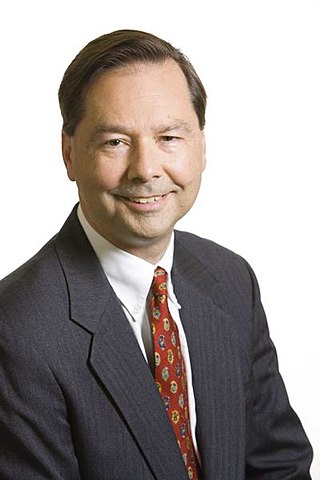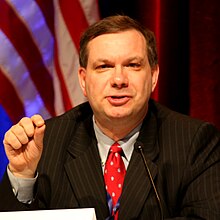Accountability, in terms of ethics and governance, is equated with answerability, culpability, liability, and the expectation of account-giving.

Gregory Allyn Palast is an author and a freelance journalist who often worked for the BBC and The Guardian. His work frequently focuses on corporate malfeasance but he has also worked with labour unions and consumer advocacy groups.
Electoral fraud, sometimes referred to as election manipulation, voter fraud, or vote rigging, involves illegal interference with the process of an election, either by increasing the vote share of a favored candidate, depressing the vote share of rival candidates, or both. It differs from but often goes hand-in-hand with voter suppression. What exactly constitutes electoral fraud varies from country to country, though the goal is often election subversion.

The Help America Vote Act of 2002, or HAVA, is a United States federal law which passed in the House 357-48 and 92–2 in the Senate and was signed into law by President Bush on October 29, 2002. The bill was drafted in reaction to the controversy surrounding the 2000 U.S. presidential election, when almost two million ballots were disqualified because they registered multiple votes or no votes when run through vote-counting machines.
Election law is a branch of public law that relates to the democratic processes, election of representatives and office holders, and referendums, through the regulation of the electoral system, voting rights, ballot access, election management bodies, election campaign, the division of the territory into electoral zones, the procedures for the registration of voters and candidacies, its financing and propaganda, voting, counting of votes, scrutiny, electoral disputes, electoral observation and all contentious matters derived from them. It is a discipline falling at the juncture of constitutional law and political science, and involves "the politics of law and the law of politics".

Voter suppression is a strategy used to influence the outcome of an election by discouraging or preventing specific groups of people from voting. It is distinguished from political campaigning in that campaigning attempts to change likely voting behavior by changing the opinions of potential voters through persuasion and organization, activating otherwise inactive voters, or registering new supporters. Voter suppression, instead, attempts to gain an advantage by reducing the turnout of certain voters. Suppression is an anti-democratic tactic associated with authoritarianism.
This bibliography of George W. Bush is a list of published works, both books and films, about George W. Bush, the 43rd president of the United States.

Kris William Kobach is an American lawyer and politician who is the attorney general of Kansas. He previously served as the 31st secretary of state of Kansas. A former chairman of the Kansas Republican Party, Kobach came to national prominence over his support for immigration controls, including involvement in the implementation of high-profile anti-illegal immigration ordinances in various American cities. Kobach is also known for his calls for stronger voter ID laws in the United States, reinstating the National Security Entry-Exit Registration System, and his advocacy for anti-abortion legislation. He has made claims about the extent of voter fraud in the United States that studies and fact-checkers have concluded are false or unsubstantiated.

Hans Anatol von Spakovsky is an American attorney and a former member of the Federal Election Commission (FEC). He is the manager of The Heritage Foundation's Election Law Reform Initiative and a senior legal fellow in The Heritage Foundation's Meese Center for Legal and Judicial Studies. He is an advocate for more restrictive voting laws. He has been described as playing an influential role in making concern about voter fraud mainstream in the Republican Party.

The Brennan Center for Justice at New York University School of Law is a liberal or progressive nonprofit law and public policy institute. The organization is named after Supreme Court Justice William J. Brennan Jr. The Brennan Center advocates for public policy positions including raising the minimum wage, opposing voter ID laws, and calling for public funding of elections. The organization opposed the U.S. Supreme Court's ruling in Citizens United v. FEC, which held that the First Amendment prohibits the government from restricting independent political expenditures by nonprofits.

Bureaucracy is a body of non-elected governing officials or an administrative policy-making group. Historically, a bureaucracy was a government administration managed by departments staffed with non-elected officials. Today, bureaucracy is the administrative system governing any large institution, whether publicly owned or privately owned. The public administration in many jurisdictions and sub-jurisdictions exemplifies bureaucracy, but so does any centralized hierarchical structure of an institution, e.g. hospitals, academic entities, business firms, professional societies, social clubs, etc.
Criticism of democracy has been a key part of democracy and its functions. Democracy has been criticized both by internal critics and external ones who reject the values embraced and nurtured by constitutional democracy.
This is a bibliography of literature treating the topic of criticism of Islam, sorted by source publication and the author's last name.
Voter suppression in the United States consists of various legal and illegal efforts to prevent eligible citizens from exercising their right to vote. Such voter suppression efforts vary by state, local government, precinct, and election. Voter suppression has historically been used for racial, economic, gender, age and disability discrimination. After the American Civil War, all African-American men were granted voting rights, but poll taxes or language tests were used to limit and suppress the ability to register or cast a ballot. The Civil Rights Act of 1964 improved voting access significantly.
Voter impersonation, also sometimes called in-person voter fraud, is a form of electoral fraud in which a person who is eligible to vote in an election votes more than once, or a person who is not eligible to vote does so by voting under the name of an eligible voter. In the United States, voter ID laws have been enacted in a number of states by Republican legislatures and governors since 2010 with the purported aim of preventing voter impersonation. Existing research and evidence shows that voter impersonation is extremely rare. Between 2000 and 2014, there were only 31 documented instances of voter impersonation. There is no evidence that it has changed the result of any election. In April 2020, a voter fraud study covering 20 years by the Massachusetts Institute of Technology found the level of mail-in ballot fraud "exceedingly rare" since it occurs only in "0.00006 percent" of individual votes nationally, and, in one state, "0.000004 percent — about five times less likely than getting hit by lightning in the United States."

The Presidential Advisory Commission on Election Integrity, also called the Voter Fraud Commission, was a Presidential Commission established by Donald Trump that ran from May 11, 2017, to January 3, 2018. The Trump administration said the commission would review claims of voter fraud, improper registration, and voter suppression. The establishment of the commission followed Trump's false claim that millions of illegal immigrants had voted in the 2016 presidential election, costing him the popular vote. Vice President Mike Pence was chosen as chair of the commission and Kansas Secretary of State Kris Kobach was its vice chair and day-to-day administrator.

Fish v. Kobach was a 2018 bench trial in the United States District Court for the District of Kansas in which five Kansas residents and the League of Women Voters contested the legality of the Documentary Proof of Citizenship (DPOC) requirement of the Kansas Secure and Fair Elections (SAFE) Act, which was enacted in 2011 and took effect in 2013.
The Public Interest Legal Foundation (PILF) is an American conservative legal group based in Alexandria, Virginia, which is known for suing states and local governments to purge voters from election rolls. The nonprofit was constituted in 2012.

The For the People Act, introduced as H.R. 1, is a bill in the United States Congress intended to expand voting rights, change campaign finance laws to reduce the influence of money in politics, ban partisan gerrymandering, and create new ethics rules for federal officeholders.









